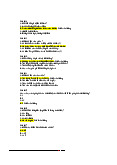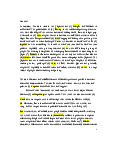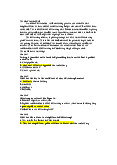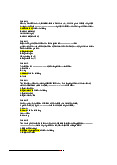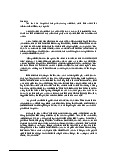






Preview text:
Announced by German Chancellor Olaf Scholz in
February 2022 in reaction to the Russian attack
on Ukraine, the Zeitenwende – meaning a
watershed moment – was quickly picked up in
the international debate, becoming an appeal
for a rules-based international order. Meanwhile,
the war caught the European Union in a
vulnerable position. For about a decade now, the
EU has been struggling to contain anti-
democratic developments in some of its
member states. A broad portfolio of
countermeasures has been applied, yet not with
full force. As a result, the ongoing rule of law
backsliding in Poland and Hungary is threatening
the overall unity and integrity of the EU. Can
the Zeitenwende become a momentum for
change in protecting the rule of law in Europe? A rule of law crisis
In recent years, we have witnessed how some
member states intentionally undermine the rule
of law at the national level and question the
legal order of the EU. A systemic democratic
backsliding started in 2010 with the electoral
victory of Fidesz in Hungary and was followed by
the Polish Law and Justice Party (PiS)
government since 2015. In response, the EU has
agreed on a range of instruments to safeguard
the rule of law across the continent.
But the resistance of ‘rule breakers’ does
not easily wear off. First, Article 7 – once
nicknamed the ‘nuclear option’ because, in the
worst-case scenario, it could strip a member
state of voting rights – proved futile. Triggered
against Poland and Hungary, the procedure
remains inconclusive. Next, the infringement
procedures launched by the European
Commission before the European Court of
Justice failed to solve fundamental problems
with judicial independence in Poland. Now, the
approach of using money as leverage to
persuade non-abiding governments to change
their ways seems promising though. The EU still
holds cohesion funds from Hungary and money
from the Covid-19 recovery fund from Poland.
A decade of destructive developments in
Hungary and Poland has exposed the EU’s
inability to fully protect its constitutional
identity. To combat rule of law breaches in the
EU, there must be consequences severe enough
to discourage governments from undermining the democratic order.
To maintain a functioning democratic order, the rule of law must be
sustained by both, robust institutional responses and political accountability.
From a technical and legal point of view, there is
space for improvement. For example, procedural
pathways should be created for member states
to meet the recommendations listed in the Rule
of Law Report and Justice Scoreboard.
Conditionality mechanisms should also be
attached to more EU programmes, grants and
loans. Additionally, identifying synergies
between single rule of law instruments within
the legal order and competences of the EU could
improve both their effectiveness and efficiency.
Constant re-evaluation would allow for a more
accurate application of rule of law tools in the
future, including tracing favourable policy mixes.
Nevertheless, technical improvements of the
existing reporting and corrective measures are only half the battle.
Fixing rule of law erosion also requires tackling
general democratic backsliding. It is crucial to
proactively shape favourable conditions to
defend the European community of law by
strengthening democratic institutions and
practices, both at the EU level as well as in
individual member states. In countries
experiencing acute rule of law backsliding,
internal resistance is as important as external
pressure. Smart capacity building of
independent media and civil society
organisations through improved access to EU
funds via direct grant-making as well as
safeguarding their functioning through European
legislation are the right way forward.
To maintain a functioning democratic order, the
rule of law must be sustained by both, robust
institutional responses and political
accountability. It is hence important to
understand that the underlying problem of the
EU’s rule of law toolbox is not just a legal issue
but above all a political vulnerability. Power struggles
It was to be expected that targeting the
interests of non-abiding member states
directly would trigger their resistance. Still, the
EU was not ready for such a scenario. Blurring
the debates and employing pseudo-legal
arguments have become the usual tactics of
the ‘rule breakers’. When faced with legal
sanctions, they also took advantage of lengthy
procedures and the consensus-seeking nature of
the European Union to advert immediate penalties.
EU institutions also have their share of
responsibility in the decay of the rule of law.
For example, Article 7 almost failed from the
start due to the fear of the Council and the
Commission that affected countries would still
manage to obstruct important decision-making
processes before their voting rights would be
taken. The final shape of the ‘Rule of Law
Conditionality Regulation’ was watered down
in pursuit of a compromise between a more
radical position of the European Parliament and
a less invasive approach of the Commission and the Council. A for the rule of law Zeitenwende
The ongoing polycrisis the EU is facing has
aggravated rule of law disputes. The Covid-19
pandemic provided an opportunity to surpass
laws by a state of emergency, allowing
deregulation or executive orders. The soaring
energy prices and inflation provide a fertile
ground for political polarisation and
radicalisation, likely resulting in Eurosceptic,
illiberal forces gaining traction in other member
states. Yet, it is the war in Ukraine that put the
unity of the West to a test, exposing not only the
conflict of two inconceivable world orders but
also the ambiguity within the EU itself regarding
further cooperation with authoritarian regimes
and the commitment to the EU’s founding principles.
The Zeitenwende initially referred to German
foreign and security policy: abandoning
outdated paradigms in favour of a proactive
role in reshaping the defence architecture of
Europe. But by now, it has earned a far broader meaning.
The European institutions, as well as the member states, must
recognise the democratic order as a pillar of European stability.
The end of a post-Cold War era marked by the
Russian conflict against Ukraine amplifies the
need to reinforce the commitment to the rules-
based international order. This also refers to
the European Union: a peace project funded on
the principles of freedom, democracy and the
rule of law. Democratic order is a pillar of
European stability. A new comprehensive
European security architecture must embrace
the defence of the legal Union and fundamental values.
The EU is not only facing external threats and
strategic rivalry but also further enlargement. It
must be fit to tackle these challenges. The
European institutions, as well as the member
states, must recognise the democratic order as
a pillar of European stability. The rule of law is
one of its fundamental principles. The attempts
of some member states such as Poland and
Hungary to emphasise national legal traditions
as superior or to question the constitutional
principles of the EU directly undermine
European integration. Therefore, next to a
comprehensive rule of law toolbox, a favourable
political culture is needed to be proactively used
– and with full force – to avoid the impunity of
‘rule breakers’ and save the EU from disintegration.
